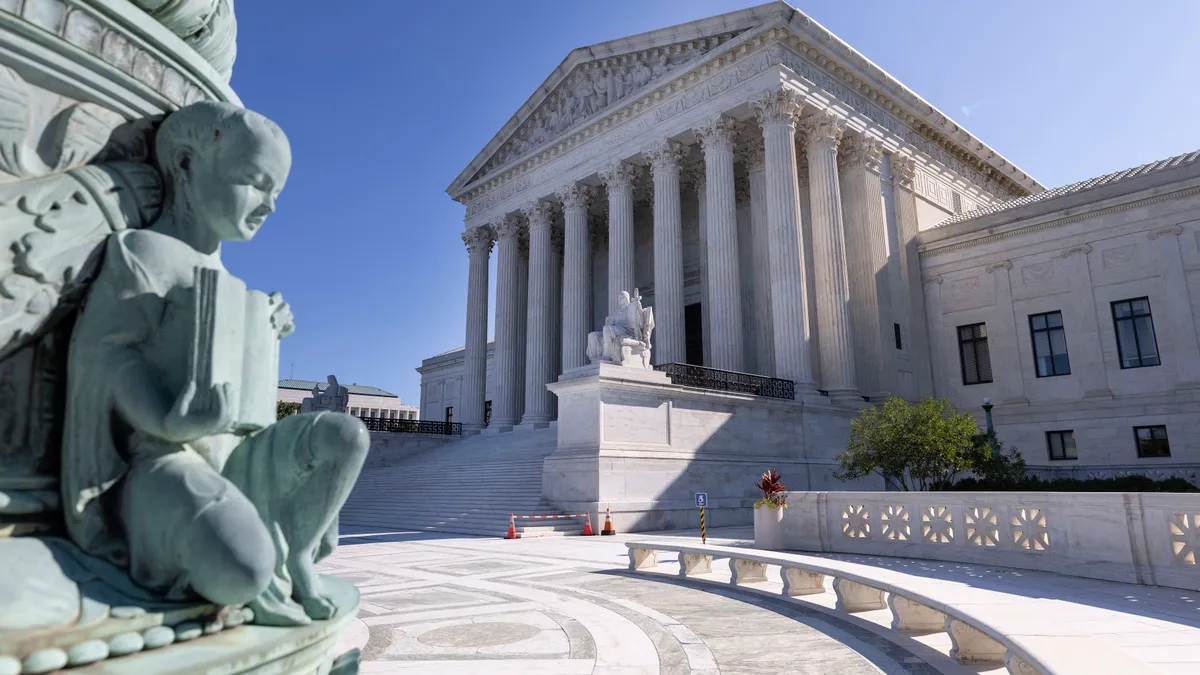The U.S. Supreme Court heard oral arguments Wednesday in a special education case that could alter the course of the dispute resolution process for school districts under the Individuals with Disabilities Education Act.
In the case, Perez v. Sturgis Public Schools, justices will decide whether individuals who have already entered into an IDEA settlement resolving their claims must still exhaust the administrative process before pursuing a lawsuit under the Americans with Disabilities Act.
During the arguments, the justices seemed torn over how to reconcile the requirements to receive monetary damages under ADA with the resolution process and relief provided under IDEA, which does not include financial remedies.
"The difficulty I'm having is that I can't see where ADA fits in with IDEA," said Justice Clarence Thomas. "It seems to be an entirely different remedy."
Complicating the issue is that it is often in the best interest of school districts and parents to enter a settlement agreement under IDEA, thereby averting further exhaustion of an administrative process — such as due process hearings — and providing students with a free and appropriate public education, or FAPE, as soon as possible. That, however, is at odds with ADA's requirement for parties to exhaust the administrative process, making it difficult for parents to pursue compensation under ADA.
"The effect of Sturgis' rule is: If he accepts the settlement on the IDEA claim … it essentially gives the school a full release, a 'get out of jail free' card on the ADA liability," said Roman Martinez, an attorney for the petitioner, to the justices on Wednesday. "That's just not right." Martinez argued on behalf of Miguel Luna Perez, a deaf student whose parents brought the case to the high court after his ADA claim was dismissed in light of an IDEA settlement.
Perez's parents originally filed the lawsuit after Sturgis Public Schools in Michigan allegedly assigned him to an unqualified classroom aide who was not trained to work with deaf students and did not know sign language. Perez's parents claimed the district misled them to believe their child would earn a high school diploma after 12th grade, when he instead earned a certificate of completion.
IDEA vs. ADA
On the other side, representing Sturgis Public Schools, attorneys argued that a settlement under IDEA prevented special education students and families from pursuing damages under ADA for the same claim.
Shay Dvoretzky, an attorney for Sturgis Public Schools, said IDEA requires "FAPE-related claims to be channeled through IDEA that may result in a situation where the plaintiff doesn't get — right off the bat — whatever their first choice specific remedy is."
"They get what IDEA provides,” Dvoretzky said during oral arguments.
On both sides, parties argued a decision for or against the Perez family would disrupt the IDEA dispute resolution process.
However, Justice Ketanji Brown Jackson questioned whether pursuing only IDEA relief would be practical in all situations, such as when 18-year-old students have already dropped out and seek financial compensation rather than an educational alternative.
"Does [the student] have to sit in front of the hearing officer and talk about ways in which her education could be changed?" Jackson said. "What I'm trying to understand is: Why do we have a statue that would make her exhaust the IDEA as if she was asking for that other form of relief?"
Implications for the decision
Wednesday's oral arguments "focused on the collision of procedures with real-world implications for families," said Selene Almazan, legal director at the Council of Parent Attorneys and Advocates, in an email. COPAA filed an amicus brief with the American Federation for the Blind in favor of Perez.
Dan Stewart, managing attorney for education and employment for the National Disability Rights Network, said the Perez case presents a critical question about how parents can effectively and efficiently pursue legal claims under the IDEA, as well as under the ADA.
"The lower court’s decision, if upheld, would result in unnecessary barriers to resolving IDEA claims through settlement negotiations, needless litigation of IDEA claims that could be settled, and pointless loss of time in getting to reasonable remedies for a youth with disability," Stewart said in an email.
He added that in the oral arguments, the student’s attorneys presented a strong case that the IDEA settlement agreement should "count” for legal exhaustion purposes. In other words, once a mutual settlement was reached with the school district on the IDEA claims, the parents were free to litigate the separate ADA claims, which include monetary relief not available under IDEA, Stewart said.
"That argument represents a commonsense way to reconcile concerns about funneling IDEA claims to the appropriate legal processes and not overburdening the courts with duplicative claims under the ADA," Stewart said.
Most IDEA claims brought against school districts are resolved before the outcome of a due process hearing, according to a brief filed on behalf of the Sturgis school district by several groups representing school administrators, including AASA, The School Superintendents Association and the Council of Administrators of Special Education. Nothing in the IDEA, the groups said, prevents students with disabilities from seeking relief under other disability-related laws once they have properly exhausted their IDEA remedies at the administrative level.
Not only are special education legal fights expensive, but "increasing the incentive for parents to engage in litigation over their student's education could also have an unintended negative impact on the creation of the IEPs [individualized education programs] in the first place," the groups wrote in their brief.
Lewis Bossing, senior staff attorney for the Bazelon Center for Mental Health Law, co-wrote an amicus brief on behalf of former federal education officials in support of Perez. He said that while it is hard to predict which way the justices will rule based on Wednesday's discussion, his hope is that the lack of special education supports Perez received as a student will implore school systems to "think again about the kinds of supports that they're providing to deaf and hard of hearing students and students with disabilities."
No change for 'meat and potatoes' issues
Other special education experts said that while this case may clear up some ambiguity around special education adjudication, it won't affect the day-to-day business of serving students with disabilities.
"One of the unfortunate parts of the legalization of special ed is that the few cases that go to the Supreme Court tend to not be what most stakeholders — whether they're school psychologists, special ed teachers, taxpayers or parents of kids with disabilities — want for legal clarification," said Perry Zirkel, a special education law expert and emeritus professor at Lehigh University.
Zirkel said the high court likely took the case to settle the unanswered question in the 2017 Fry v. Napoleon Community Schools case: "Do you need to exhaust IDEA remedy of a due process hearing if you are seeking money damages, which is available under the ADA but not under the IDEA?"
While the exhaustion issue and its asserted exception for money damages often come up in litigation for IDEA-eligible students, Zirkel said, they do not have the significance of the "meat and potatoes" legal issues of special education that most impact students, families and educators. Those include: a school system's obligation to identify students who may be eligible for special education, known as child find; determining a child to be eligible for special education; and the student's academic placement, known as least restrictive environment.
It is not known when the high court will issue a decision in the case, but the justices tend to release the majority of their decisions in June before recessing.
Correction: A previous version of this article misattributed the full authorship of an amicus brief. The brief was co-written by Lewis Bossing on behalf of former U.S. Department of Education officials.









 Dive Awards
Dive Awards














